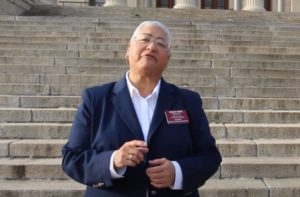California AG interjects with brief in West Virginia trans athletics case
(The Center Square) – Twelve-year-old “B.P.J simply wants to participate on her school’s girls’ cross country and track teams with her friends. B.P.J. began expressing her gender…

(The Center Square) – Twelve-year-old “B.P.J simply wants to participate on her school’s girls’ cross country and track teams with her friends. B.P.J. began expressing her gender identity at age three, and she has lived as a girl in both school and home since third grade. But … her school would not let her participate.”
So says the amicus brief filed with the 4th Circuit United States Court of Appeals, that seeks an injunction against enforcement of a West Virginia statute that categorically bars transgender female students from participating in sex-segregated sports consistent with their gender identity.
“Preventing transgender elementary kids from living regular lives through legislative action is absurd and dangerous,” said California Attorney General Bonta.
Bonta signed onto a coalition of attorneys general filing the amicus brief in B.P.J. v. West Virginia State Board of Education. The case centers around West Virginia’s House Bill 3293 which requires participation in school sports to be based on sex identified at birth.
The lawsuit before a court of appeals, against the West Virginia State Board of Education, the Harrison County Board of Education, and their respective superintendents, alleges that their refusal to allow her to play on her school’s all-girls cross-country and track teams violated her rights under Title IX of the Education Amendments of 1972 and the Equal Protection Clause of the U.S. Constitution. An earlier judgment by the district court ruled that the regulation does not violate those rights.
The brief claims that “Discrimination and exclusion on the basis of one’s transgender status cause tangible economic, educational, emotional and health harms.”
B.P.J was not permitted to try-out for the girls’ running teams as B.P.J was identified as male at birth. Setting aside the issue that female transgender sport raises for girls in locker rooms who already feel discomfort undressing in the presence of their peers, female athletes believe they are losing the athletic equality ground they fought so hard to attain.
As Selens Soule, Holly Lavesser, Hannah Arensman, join the list of female-born athletes who experience the impact of male-born individuals competing as females, the discrimination they express is often assuaged with anecdotes of fairness and equity.
Several studies have shown that the differences between males and females are vast, not completely known, and begin at conception. Overall, athletic performance can be influenced by differences in bone size and sturdiness, muscle mass and memory, muscle type and composition, muscle strength and fiber, Internal organ sizes, in utero brain development, gene determination, psychological differences and a host of developmental difference between male and female fetuses which are yet to be studied in depth. Questions are still being asked about the rate of maturity between males and females.
For B.P.J now on the cusp of puberty, these studies suggest the physiology of being male is more than hormone deep. The larger lung capacity, heart and muscular make-up are all inherent in maleness and determined in the womb.
“No child should be denied the opportunity to have a normal childhood or play school sports because of their gender,” Bonta stated.
Fourteen-year-old Kathryn Taylor says “Transwomen should have the opportunity to compete in separate leagues so that everyone can compete while ensuring safe and fair competition for women and girls.”
In this brief Bonta joins attorneys general of New York, Hawaii, Colorado, Connecticut, Delaware, Illinois, Maine, Maryland, Massachusetts, Michigan, Minnesota, New Jersey, Oregon, Rhode Island, Vermont, Washington, and the District of Columbia.



